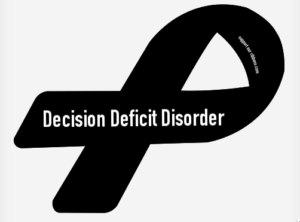 Washington, DC — Just as the holiday season can be difficult for those who have recently lost loved ones, election time is a horrific time for those suffering from a little discussed condition known as Decision Deficit Disorder (DDD).
Washington, DC — Just as the holiday season can be difficult for those who have recently lost loved ones, election time is a horrific time for those suffering from a little discussed condition known as Decision Deficit Disorder (DDD).
During the election season, DDD sufferers get overwhelmed with anxiety and confusion as they are asked to take 18 months worth of campaign-generated information to make a final decision about which candidate they will support.
“DDD can be extremely, oh gosh I just don’t what the right word would be,” said Jonah Wildarsky, who suffers from DDD and is the Executive Director of the Decision Deficit Disorder Foundation.
As a defense mechanism, those with DDD frequently accuse all candidates of being equally poor, rather than deciding who is the better one, as other voters do.
“Clinton or Trump, Trump or Clinton, it’s just not fair to ask us to decide, because they’re just so identically bad,” screamed Wildarsky. “The pressure during the last month of the campaign is immense. I’ve personally had to suffer through 127 news interviews this year, because there are just so few DDD survivors left for reporters to interview.”
The Foundation works to create awareness of DDD. For instance, Wildarsky says the Foundation hopes some day to distribute ribbons, if a color choice can be finalized.
“Golly, I don’t know, is yellow or pink or some other color best,” asked Wildarsky. “The colors all seem equally bad to me. Why in the world can’t we have better colors?”
